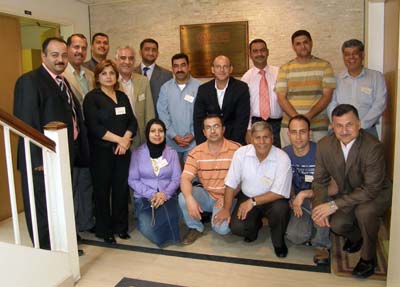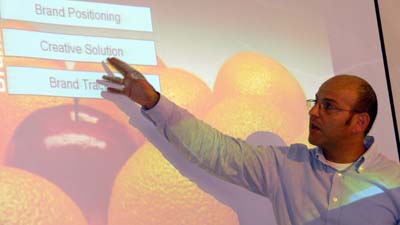Fifteen executives from print, broadcast and online outlets across Iraq could not get enough of a three-day "Media Management" workshop in Lebanon that exposed them to a whole new market- and consumer-oriented approach.
"The workshop was very useful and of great strategic importance but too short and requires a longer stretch," said Waad Ibrahim Mutlaq of Basra's Shanatel AM radio station.

Iraqi media managers surround JTP trainer Paul Boulos (Abu-Fadil)
His colleagues, some of whom had never been trained in media management but were nonetheless running organizations of various sizes, echoed the sentiment.
They had traveled from Baghdad, Basra, Suleimaniyya and Erbil to attend the immersion course organized by the Journalism Training Program (JTP) at the American University of Beirut in July.
Since the 2003 U.S. war, the Iraqi landscape has seen a mushrooming of media from government partisan to liberal and independent to religious sectarian where previously only state-run institutions were allowed.
Journalists who did not toe the former Baath party line were considered suicidal.
But with the toppling of Saddam Hussein and liberalization of the media came a torrent of outlets in a free-for-all jockeying for political and religious position that created a journalistic Tower of Babel.
The opening up in the war-torn country has also seen a spike in deaths of journalists in recent years, with Iraq being considered one of the most dangerous places on earth in which to ply the trade.
Running a TV station, publishing a newspaper, or just covering daily news, is considered hazardous so Iraqis in media institutions often claim they work in other fields to avoid being targeted by any number of antagonists.
Those who recently visited Lebanon not only enjoyed a change of ambience but got a taste of the fast-paced and diversified media scene during a workshop that tackled an often neglected topic: the management of an organization in an increasingly converged world.
While Western media are themselves overwhelmed by drastic changes in platform and delivery systems of information, countries like Iraq burdened by civil strife and wobbly economies, face greater challenges in trying to keep their heads above water.
Lebanese marketing and communications expert Paul Boulos introduced workshop participants to the Arab media landscape, reviewed regional and international media trends, and spoke of global best practices.
He focused on consumer research and market analysis which are usually overlooked, perhaps due to ignorance but also because of limited resources and distrust of statistics or data gathering mechanisms.
In a country rocked by sectarian violence, being a pollster from the wrong religious denomination could be fatal.
Boulos also highlighted the importance of building brands across platforms and zeroed in on coping with the digital world of multimedia.
"It's something I've been wanting to do for years," he said of the opportunity to reach out to the Iraqis, noting that despite the proliferation of some 500 (and counting) Arab satellite TV channels for example, many lacked professional management strategies.

"Media Management" trainer Paul Boulos explains brand
positioning (Obeid)
Boulos emphasized the need to target consumers needs, adding that for far too long Arab media had focused on creating content without paying adequate attention to investment and financial considerations.
"Media is an investment market, just like telecoms or any other market," he told the pan-Arab daily Asharq Al-Awsat in an interview. "Therefore, in media management we should focus on central issues to change the old concepts in this sector."
Boulos called for more interaction with Arab audiences and consumers by allowing traditionally passive recipients to share in the making of the media messages.
"It was very positive and provided us with ample information, notably since we're still learning to cope with free media in Iraq," commented Mutammam Mohammad Ali of Al Iraqiyya TV.
Decision-making in Iraq and many Arab countries is still a bottom-down process in media run by governments, parties or families.
Boulos blamed the lack of strategic planning and vision on the disconnect between the media's real world operations, the incredible speed with which technology has changed information gathering and dissemination, and educational institutions that frequently graduate functionally illiterate executives.
He also cautioned against being too enamored of the Internet, saying it was not a medium per se but a media platform.
"So (Arab) media organizations should not consider their websites as just another, or additional, edition of their print or broadcast products, but a platform for personal communication and cooperation."
Editor Nadia Hashem of Iraq's National Media Center said she wished the workshop had lasted at least 12 days, while Taleb Hanoweet of Al Sabah newspaper said he would have liked to focus more on his country's media.
Overall, the participants recognized their need for additional workshops and that Iraqi media officials lacked adequate training in how to direct their respective organizations.
The intensive course, funded by Support for Independent Media in Iraq (SIMI), involved presentations, team projects and issues of leadership.
Participants represented SIMI, Al Mahaba FM radio, Al Hurriya satellite TV, the National Media Center, Al Furat TV, Noa radio, Baghdad satellite TV, Al Hurra TV, Al Takhayul Media, Shanatel radio, Al Iraqiyya TV and Al Sabah newspaper.
Boulos is a veteran of the international advertising agency Leo Burnett and Lebanon's LBCI TV who now runs the Square One consulting firm and doubles as Middle East/North Africa business development director of Drive Communication.